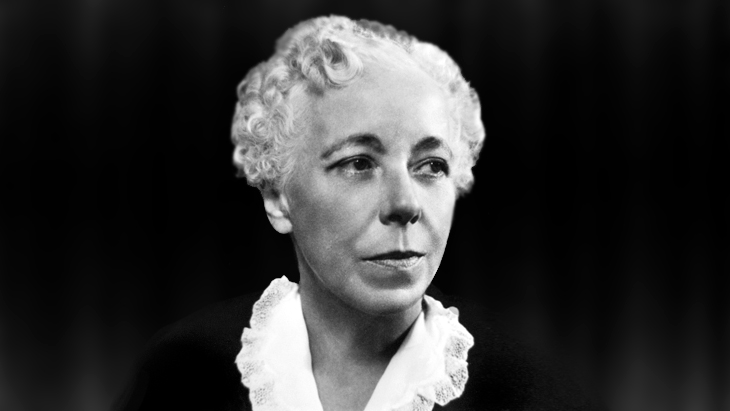In analyzing Karen Horney’s biography, we see that she is one of those figures who deserve to have a space of her own in history, not just in the scientific realm, a woman ahead of her time who dared to question the fundamentals of the psychology of her time. .
Her revolutionary theories confronted the most conservative parts of science, however, in addition to this conflict, there was the difficulty of being a woman in a world of male theories.
- Karen Horney.
- A German psychoanalyst of the early 20th century.
- Founder of feminist psychology and co-founder of neofreudian psychology.
- Was one of the most critical voices of Sigmund Freud’s theories.
- The repeated cases of depression she experienced during her youth led her to obtain a Bachelor of Medicine.
- And she eventually consolidated he he he himself as a psychoanalyst.
- Horney developed revolutionary theories about personality and neurosis.
- Which eventually triggered his expulsion from the New York Psychoanalytic Institute.
She was an extremely influential woman in psychological progress, in addition to making great contributions in the field of neuroticism, she has also done so in the psychological attitude towards women, it should not be forgotten that the field of psychology was dominated by men in the early twentieth century and that depended a lot on Freud’s progress.
Horney defended the idea that men feel inadequate and jealous of women’s ability to create and develop life. This was why men sought to dominate all other important areas of life. Contrary to Freud’s beliefs, Horney called this phenomenon “belly envy. “
Karen Danielsen was born on September 16, 1885, in Blankenese, Germany. His childhood was marked by a very severe father who imposed a strict education on him. From a very young girl she took refuge with her older brother, from whom she felt very close.
When her brother walked away from her, Karen fell into a deep depression that would most often be repeated throughout her youth and devoted herself body and soul to her studies. Years later, Karen Horney would remember that at the time she had decided that if she could not be beautiful, she would be smart.
In 1906 he enrolled at the Faculty of Medicine of the University of Freiburg, one of the few universities that hosted women at the time, later moved to the University of Gottingen and finally, in 1909, he chose to study psychoanalysis at the University of Berlin, a school of emerging psychology at the time, graduated in 1915.
In 1910 he married a classmate, Oskar Horney, the result of this marriage, his three daughters were born.
During her early professional career, Karen Horney worked as a teacher and analyst at the Berlin Psychoanalytic Institute, however, despite her good professional situation, her life began to swing on a personal level, her marriage stopped working and her older brother passed away. of a lung infection. As a result, Karen found herself again in a long state of depression.
In 1932, Karen Horney moved to the United States, where she worked as an associate director at the Chicago Institute of Psychoanalysis; two years later, she moved to Brooklyn and established he or she was a teacher at the New School for Social Research and the New York Psychoanalytic. Institute.
During these years, Karen Horney began to develop her theories about neurosis and personality, at which point she came into contact with other authors of the time, such as Erich Fromm and Harry Stack.
Horney’s theories turned out to be quite critical and contrary to the original Freudian theories, which cost him his expulsion from the Psychoanalytic Institute in New York. It was then that she and other dissidents founded the American Journal of Psychoanalysis and the American Institute for Psychoanalysis, where she worked until her death in 1952.
Karen Horney’s biography shows that differences between men and women manifest themselves in differences in education and socialization, not biology, as had long been argued. It was the forerunner of feminist psychology who argued that it is the power differences between the sexes that affect women’s minds. Bless you.
Horney dared to counteract the Freudian vision of penis envy. Breaking with tradition, he defended the idea that what women envied was male power and privilege, not the penis.
He also criticized Freud’s Oedipus complex, which he saw as a product of insecurity in the father-son relationship, defended the fundamental role of environmental influences on psychological development and considered narcissism to be the result of low self-esteem and excessive indulgence in psychological development. childhood, not psychological disorder.
Karen Horney worked against the theories that supported the masochistic nature of women, their dependence on love, money and the protection of men, and believes that this way of thinking has made women attach great importance to qualities such as charm and beauty, and to seek the meaning of life through their husbands and children.
Horney pioneered in many ways: from her contribution to psychology, with her theories about neurosis and personality, to her time at university at a time when women were delegated to the domestic realm; his statements and criticisms, especially those relating to Sigmund Freud, provoked rejection in a world that, perhaps, seemed small.
In 1967 the 14 articles that made up her book Female Psychology were published posthumously, her work and work have influenced humanistic and Gestalt psychology, psychotherapy, psychoanalysis, Ellis’s emotional emotional therapy, existentialism and feminism.
No doubt Karen Horney’s biography shows us that she left an unprecedented legacy, whose path was not easy and was marked by a constant struggle, an internal struggle, linked to her depression, and an external struggle, as a result of being a woman. and the difficulty of being heard in a world of men.

